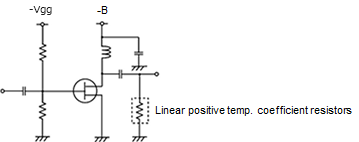Example of temperature compensation circuit
Temperature compensation of the high-frequency output stage
Linear positive temperature coefficient resistors are suitable for circuits that require linear detection of changes in the resistance value, such as temperature compensation within the operating temperature range. LP73 and LT73 are recommended for the general applications, and LT73V is recommended for the automotive applications.
(e.g.) Bias resistors and output load resistors for compensating
the temperature of high frequency amplifiers.

This is an example of a high frequency amplifier used for mobile radio. If the gate voltage is constant when the ambient temperature rises, Idd increases and the temperature rises further.
Therefore, LP73 and LT73 resistors with stable positive temperature coefficient, should be used in Rc to compensate the temperature.
In this circuit, when the resistance value of Rc increases due to the temperature rise, the gate voltage is deeply biased in the negative direction, and Idd tends to decrease. Then the negative feedback is applied to stabilize heat generation.
